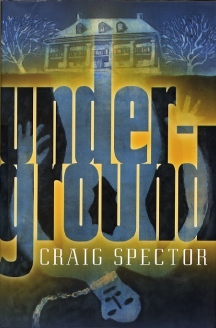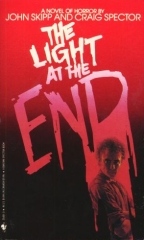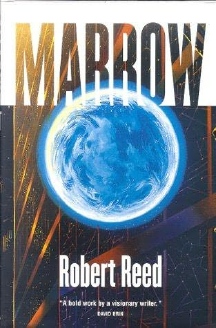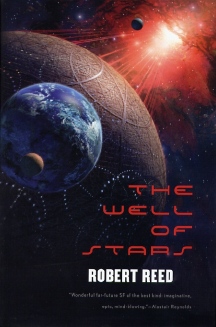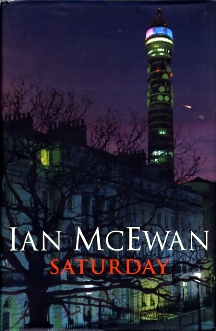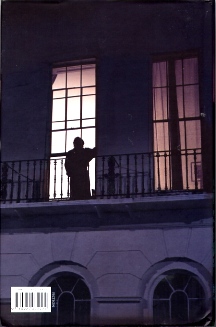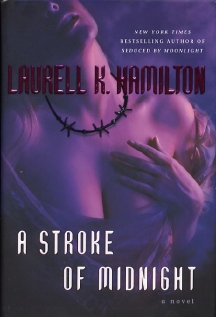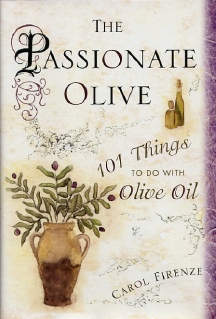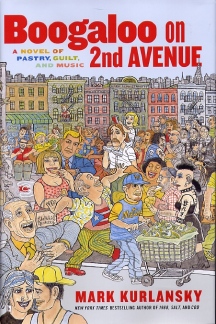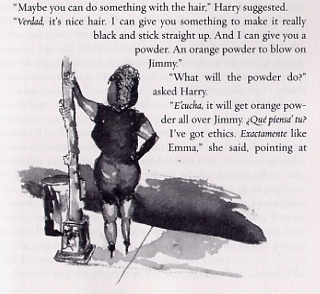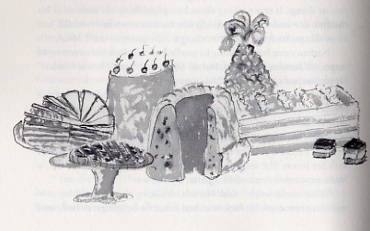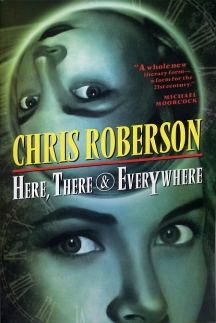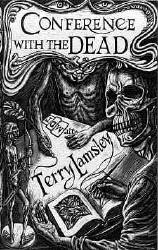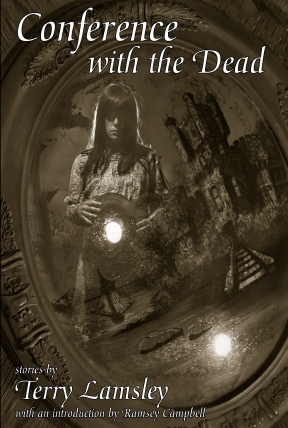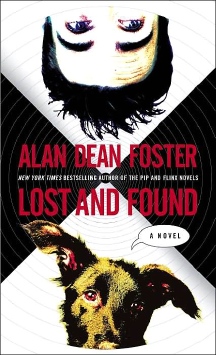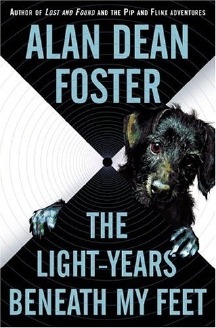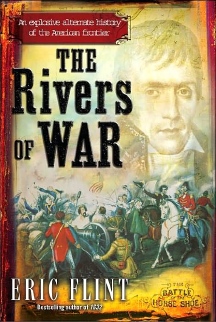|
|
|
This Just In...News from the Agony Column
|
04-08-05: Craig Spector was 'Underground'; Robert Reed Escapes 'The Well of Stars'; Eva: A NASA Robot |
||||||
Springtime
for Horror in America
So, for those of us who were in trainers in the 1980's -- a distressingly high proportion, I find -- it's time for a little recap. Somewhere between the time Stephen King found 'It' and Clive Barker charted the path of 'The Hellbound Heart' (filmed as 'Hellraiser'), John Skipp and Craig Spector popped off a very nasty vampire novel titled 'The Light at the End'. Not long after, they become members of the original band of Splatterpunks, along with David J. Schow. They cut a bloody swathe through the mass-market paperback world with titles that include 'The Cleanup' and 'The Scream', and eventually brought us -- via Mark V. Ziesing, in his publishing days -- 'The Book of the Dead'. But when the eighties horror boom imploded after too many foil-lettered, gut-splattered paperback titles, when the fiscal blood had flowed, the writing team of Skipp & Spector (which my wife always thought of as "Skip Inspector") dissolved. But in their day, in those bad old days when a bloodied corpse looked pretty good compared to double-digit home mortgage rates, Skip Inspector ruled.
Yes, we missed Spector's bleak, visceral violent bent, but now we've got it to hand again in a nice, new hardcover format. No more paperback originals for Spector. I'm thankful, as my browned, bent copies of 'The Scream' and 'The Light at the End' will attest. Spector's playing to his strengths here with a simple setup. Twenty years ago, something bad happened in the Custis Manor, a creepy old plantation house. The seven friends who called themselves "The Underground" crossed a line that should not be crossed. One ended up dead, one just disappeared. Those left behind tried to forget about it, cover it up, in keeping with the times, those bad old 1980's. But some things wont stay covered. And fortunately for readers who like violent, actually scary horror novels, Craig Spector is one of those things. "Monstrous deformities of the spirit made flesh," reads a passage of this novel. Which is precisely why we like horror in general and Craig Spector in specific. Let the prices rise, let the rich rot in splendor while the poor starve on their doorstep. Craig Spector will enflesh the deformities of our spirit with blood-slicked prose. He's always willing to cut to the chase, no matter how gory and violent the path may be. It's good bloody fun. Remember that? It's back. |
||||||
A Sequel for 'Marrow' and 'Mere'
So, first go back to square zero and score 'The Dragons of Springplace' and 'Marrow'. The first of these will set you back some twenty to fifty bucks. The latter is only going to cost you ten bucks. Oh, and you'll want 'Mere' as well from Golden Gryphon. Read the short stories "The Remoras" and "Aeon's Child" to set yourself up, then slip into 'Marrow' to explore the Great Ship. And then 'Mere' to find the consequences. Got it? Good. Now you're ready for 'The Well of Stars'. The Great Ship is on a collision course with the Ink Well, a nebula that those aboard the Great Ship fear with good reason. They may not know the limits of the ship itself, but they know that within the Ink Well is something that does not anyone who voyages within to return. Humans and aliens and those who are both run the risk of apocalypse to face a force that must be benign. It must be willing to help. But why is it hiding and what secrets is it keeping? Certainly the secret of Reed's superior science fiction. His fiction lives a life analogous to that of its subject; buried within the complex world of science fiction is the equally complex world of Robert Reed. Wheels within wheels. Sensawunda to spare. Pay attention. It's Robert Reed. He's the kind of writer that science fiction writers recommend, what is called in the parlance, "a writer's writer". Turn him into a reader's writer, but do so at the risk of finding yet another author with an extensive back catalogue. Still in these Bad Old Days, you can never have too much of a Good Thing. |
||||||
A
NASA Robot
It's just the head. Since we live ever in the present, our present, it's nice to have these terrorizing reminders that we actually live in what many of us would consider the future -- that is, a time when scientific advances long predicted by science fiction writers to happen sometime in the nebulous future actually arrive in the precision of the present. This is clearly one of those times and this is clearly one of those advances. Just do me a favor when you email to your many friends -- send them the link to my article: http://trashotron.com/agony/news/2005/04-04-05.htm#robot So they can drop by my place on their way to the present future. In that way, this article becomes a sort of science fiction -- a buffer between their present and their future. |
|
04-07-05: Ian McEwan's 'Saturday'; Laurell K. Hamilton's 'A Stroke of Midnight'; Carol Firenze 'The Passionate Olive' |
||||
'Saturday'
in the UK
But as the UK edition recently fell into my lap, I thought I'd take the time to mention to readers, many of whom are UK-o-philes like me, that the UK hardcover is drop-dead beautiful outside as well as inside. Now, I like the cover art for the US version fine, but it's on the simplistic side. Jonathan Cape has done up a trade hardcover that features a gorgeously degined and printed cover photomontage by Chris Frazier Smith. What's more there are three other states for this novel. There's a trade paperback -- available now -- for £5.99, a "cased edition" and a "limited edition". I can't find any information on the cased edition, but the limited edition will set you back something between $100 to $175, or, via *.*, £98.00. The problem is that it's issued without the DJ in an illustrated slipcase, and it's unclear to me whether or not the slipcase illo is the same as the DJ illo. I believe that it is not. It's signed of course, and the print run is 1500 copies. I find myself weighing back and forth on whether or not to seek one out, and rather wishing that Jonathan Cape farmed out their work to Hill House. Still, authentic limited UK edition. Think how few folks thought to buy the first Harry Potter; McEwan is a known quality. All right folks, enough book ogling; time to move along to actual content. But with a cover like that, damn, it's just the kind of book you lug around the house with you in your "books I must pet" pile. You do have a "books I must pet pile", don't you? |
||||
Playing
in the Darkness
Well, we all know how that went. Alas for my reading tastes, Hamilton has pursued a course of sex, sex, more sex, weird sex and weirder sex as the series has progressed. So I was kinda stoked when she started up a new series about a private eye who was also a faerie queen with 'A Kiss of Shadows'. Alas, once again the intriguing private eye aspect has been booted for a get-the-girl-pregnant storyline. And that brings us to 'A Stroke of Midnight' (Ballantine / Random House ; April 12, 2005 ; $23.95). Uh huh. Get it? A stroke...well, you know. Unfortunately, you probably do know. Pregnancy is becoming ever more urgent for Merry, and so the partners are becoming increasingly questionable. She's got to produce an heir. Goblins enter the picture, and you know, as I like Hamilton's sense of invention and her re-creation of the traditional monsters, I'm intrigued by this possibility. But plot-wise, basically, Merry is going to have sex with everyone in sight, and a few best not seen, probably all at once. Somewhere in there, the end of the world comes along, and intriguingly, human police get dragged into the realms of faerie. I hope to heck they brought their blue pills, theyll surely need 'em. You know, I wonder if the latest round of pharmacological wonders has made their way into Merry's world. And especially what they'd do to or for the already super-powered Sidhe. I have to admit that I thought this newer, thinner Merry Gentry novel might wring the focus away from, well, sex. That's probably not the case, but if youre looking for a novel with lots of novel sex, then this is the novel for you. Chances are it will keep you up to the stroke of midnight -- and beyond. |
||||
101 Things to Do With Olive Oil
But Firenze, unsurprisingly a member of the California Olive Oil Council, has cooked up quite a bit more than a simple cookbook here. I dont know about you, but the majority of the cooking in our house involves some quantity of olive oil, which I pretty much buy and use in total ignorance. But with the arrival of 'The Passionate Olive' that no longer need be the case. There's a nice whole chapter on the different types of olive oil, and what those differences mean. If you've always wondered how olive oil can be "extra virgin", then this is the book for you. Once you get your varieties sorted, well, if the activity is amenable to the addition of any type of oil, cooking or otherwise, then Firenze is there to tell you how olive oil fits in. She includes a number of decent recipes for food, simple enough to tempt the untutored and the unskilled. She'll tell you how to suffocate a tick, apply it to a stuck zipper, use it to kill head lice, prevent hairballs in cats, and even its uses in magical potions. How many have I hit there, what five uses -- ninety-six left for you to discover. The book has an interesting printing scheme -- dark green print on light-greenish paper, but none of it looks seasick. One is given to wonder if olive oil was involved in the printing process. Possibly. Probably. Yes, with 'The Passionate Olive', readers can explore the outer limits of olive oil usage, while the editor of the column explores the outer limits of appropriate selection criteria. If readers aren't careful, we'll get to travel guides and baseball. Wait, we've already been there. "People may experience irritation." Ouch! |
|
04-05-05: Terry Lamsley's 'Conference With The Dead' |
||||||
It's
Alive
One need look no further than author Terry Lamsley for another example of the high values that Ash Tree's releases fetch. First published by Ash Tree in 1996, 'Conference With The Dead' was available in a run of 500 copies for $50.00. The scarce copies you can find now will cost you upwards of $500.00. For the truly compulsive and cash-enabled collector, its worth it. You get all the Ash Tree goodness -- the great production values and a true first edition. You get a collection that won an IHG award, a 'Children of the Night' award and was nominated for a World Fantasy Award.
This is a book that clearly deserves more than 500 readers. And for that reason, Night Shade Books is bringing this classic back into print in a beautifully done hardcover printing at a price of $29.00 -- at least for now. The cover art by J. K. Potter alone would get my immediate attention and cash. The limited-to-175 copies edition includes a new story by Lamsley, 'His Very Own Spatchen', not included in the original collection. But any Lamsley is worth getting, pronto. Of course, the most interesting aspect of all this is the fact that one small press is re-printing out-of-print material from another. Not only does it give hope for those of us who missed -- and might now be missing -- small press releases, it suggests that small presses are very strong indeed. And perhaps, they're no longer quite so small. They're not printing too many books -- they're printing too few books. They're printing and re-printing the classics while New York merrily prints palettes worth of bestsellers to be moved from the new release shelf to the remainder shelves. Night Shade and Ash Tree are printing books that readers really, really want to read. Imagine that. |
|
04-04-05: Alan Dean Foster 'The Light Years Beneath My Feet'; Eric Flint, 'The Rivers of War' |
||||||
Marcus & Walker V2
OK, not the heavyweight, but like a lot of readers I have a lot of affection for this writer's work. After all, he novelized the iconic movie 'Dark Star'. He was deservedly sainted for this act of self-sacrifice and has been rewarded with a punishing, I mean publishing schedule that administers 440 volt shocks should his fingers leave the keyboard for more than fifteen minutes at a time. He is probably one of the five elephants upon which the Discworld of science fiction rests. While I missed out on Pip and Flinx -- not easy, as there were eight books worth of their adventures -- I've just had the second book of the adventures of Walker and George dropped in my inbox. Walker and George are, we're told, "Pip and Flinx for the next generation." I'm wondering what exactly that generation might be; the Geritol generation? The Halo Generation? Are we writing books for aging adolescents with Depends under their blue jeans or jaded adolescents who have to be tasered before they'll put down their game controllers? Is it possible to cover both bases?
The setup for Walker & George is pretty straightforward. Marcus Walker, a successful Chicago commodities broker, is abducted by aliens. Theyre going to sell him as a pet. The only other terrestrial aboard the craft is George -- a dog that's been given the ability to talk. In 'Lost and Found', they meet and greet and, yes it's a spoiler, but how much of a spoiler can it be, really -- they escape. No, the point with books like 'Lost and Found' and 'The Light Years Between My Feet' is not the destination -- it's the journey. Shouldn't that be obvious, given the titles of the books? So the question becomes, how is the ride? Open the book to a random page and find: " Once again, the sport analogy reared its bloody head. Was there a special global media feed for all of Niyu? The round-the-clock, "all war, all the time" channel? Sadly, he realized such an innovation was also possible on Earth." So yes, sort of a groaner, but then a clever, thought-provoking and rather intelligent groaner. And I'm not averse to a novel of groaners, really. Moreover, now I want to go to Ted Turner and pitch the "all war, all the time" channel. But then I'd have to cut Foster in on the deal, and I'd have to muscle my way through to Turner, and hassle all the lawyers, and blah -- hell, I'd rather just sit on the back porch and read the damn books. I'll sip beer, groan, read quotes to the wife, and try to foist the book off on a teenager whose hands are unable to grasp anything in a dust jacket. You know, I hope to hell Foster is out there designing games based on these books -- or getting proceeds from the folks who are. Not that I'll play those games, mind you, even if you do taser me or threaten to hide the Depends. |
||||||
An Alternate American Frontier
'The Rivers of War' however, won't be able to trade on nostalgia very long. That's because it's an alternate history of the American Frontier, and once again, I find myself wondering: "What would happen if they threw an alternate history and nobody understood actual history well enough to suss the subtleties?" Back in real history, when the alternate history genre was young writers would play on easily understood if soon-to-be-cliché ideas like "What if the South won the Civil War?" or "What if the Nazis won World War Two?" It was --and pretty much still is -- a given that most people who pick up a book know that the South didn't win the Civil War, or the Nazis didn't win World War Two. But when it comes to the American Frontier, well, the "given" knowledge starts to get a good deal dicier. So the writer has to be especially inventive and astute, choosing to change only the history that is well understood. Well, I have to say that Flint may have found an in here -- he may have decided to change a bit of history that we're all pretty much aware of. And the parts we're not aware of, well, theyre parts we'll enjoy sort-of learning about in the novel itself. You see, the appeal of historical fiction is to a certain extent the history lesson we get in the fiction. The same sort of holds true for alternate historical fiction, but where the reader is to draw the lines depends entirely on how cleverly those lines have been selected and drawn by the writer. So, what Flint tweaks is this. American Frontier, 1806. Native Americans -- the Cherokee tribes are being driven west in ruin. What if, instead of fighting amongst themselves, they united? What if they then found allies in American politicians, and in escaped slaves? What sort of Indian Nation might the young American nation have faced? Well, the answer of course, is 'The Rivers of War'. Flint sets up the book with two and a half pages of "Dramatis Personae'. While this is often knocked, I like it and I especially like it in this genre. It should in theory help readers keep straight the lines that are being bent by the author. You get Sam Houston, himself an adopted Cherokee, and action that begins with the Battle of Horseshoe Bend and ends with the battle of New Orleans. To my mind, this suggests that the book is itself the colonial "all war, all the time channel." Those who love musket battles should line up now and those who do not might want to duck before a lead ball drills a hole in their forehead. I'm told that makes it harder to concentrate on long (485 small print, large pages) books that are the first in a two-book series. As a bonus, you can now read this book and enjoy the nostalgia not only for the TV American frontier of your youth, but the nuclear paranoia as well. Sure, suitcases have been swapped for ICBM's, but the mushroom cloud remains the same. Duck, cover, and take a good book with you to read in the bunker. And be glad that books aren't accompanied by annoyingly memorable theme music. |
